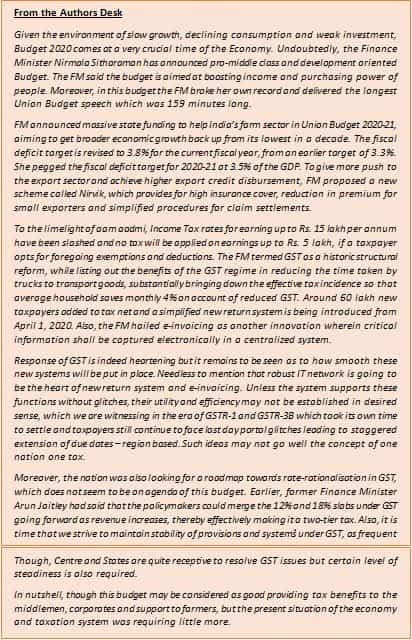Reetu | Feb 3, 2020 |

Highlights of the Union Budget 2020 on 3 prominent themes – Aspirational India, Economic Development and Direct tax proposal
The Finance Minister Nirmala Sitharaman presented Union Budget 2020 in Parliament on Saturday, February 1st, 2020. She stated that the government shall work towards taking the country forward so that we can leapfrog to the next level of health, prosperity and well-being.
The budget was presented in the backdrop of two cross-cutting developments:
a) Proliferation of technologies, specially analytics, machine learning, robotics, bio-informatics and Artificial Intelligence; and
b) The number of people in the productive age group i.e. 15-65 years in India, being at its highest.
This combination is special to contemporary India. The energy, enthusiasm and the innovation of our youth are the ignition required to push forward. The Indian spirit of entrepreneurship which weathered several storms over the centuries inspires and motivates all of us alike and hence the government recognised the need to support and further energise this spirit.

Highlights of the Union Budget 2020 on 3 prominent themes – Aspirational India, Economic Development and Direct tax proposal
This budget is woven around 3 prominent themes:
1. Aspirational India in which all sections of the society seek better standards of living, with access to health, education and better jobs.
2. Economic development for all, indicated in the Prime Minister’s exhortation of “Sabka Saath, Sabka Vikas, Sabka Vishwas”. This would entail reforms across swathes of the economy. Simultaneously, it would mean yielding more space for the private sector. Together, they would ensure higher productivity and greater efficiency.
3. Ours shall be a Caring Society that is both humane and compassionate. Antyodaya is an article of faith.
The aim towards this budget has been to lift up the dampened spirits of the Indian economy and to provide a stimulus towards growth whilst recovering from the current slowdown faced by businesses.
Aspirational India
A. Agriculture, Irrigation and Rural Development
1. Rs. 2.83 lakh crore has been allotted for the year 2020-21:
• For Agriculture, Irrigation & allied activities- Rs. 1.60 lakh crore
• For Rural development & Panchayati Raj- Rs. 1.23 lakh crore
2. Implementation of following model laws by State Government which have been already issued by Central government:
• Model Agricultural Land Leasing Act, 2016
• Model Agricultural Produce and Livestock Marketing (Promotion and Facilitation) Act, 2017
• Model Agricultural Produce and Livestock Contract Farming and Services (Promotion and Facilitation) Act, 2018
3. Proposed comprehensive measures for one hundred water stressed districts as water stress related issued are now a serious concern across the country.
4. Expanded PM-KUSUM Scheme that removed farmer’s dependence on diesel and kerosene and linked pump sets to solar energy to provide 20 lakh farmers for setting up stand-alone solar pumps and help farmers to set up solar power generation capacity on their fallow/barren lands.
5. To change the prevailing incentive regime, which encourages excessive use of chemical fertilisers and encourage balanced use of all kinds of fertilizers including the traditional organic and other innovative fertilizers.
6. To create warehousing, in line with Warehouse Development and Regulatory Authority (WDRA) norms.
7. To build a seamless national cold supply chain for perishables, inclusive of milk, meat and fish, the Indian Railways will set up a “Kisan Rail” through PPP arrangements.
8. Krishi Udaan to be launched by the Ministry of Civil Aviation on international and national routes
9. Integrated farming systems in rainfed areas shall be expanded. Multi-tier cropping, bee-keeping, solar pumps, solar energy production in non-cropping season will be added. Zero-Budget Natural Farming shall also be included. The portal on “jaivikkheti”, an online national organic products market will also be strengthened.
10. Proposed to put in place a framework for development, management and conservation of marine fishery resources.
B. Wellness, Water and Sanitation
1. Proposed to set up Viability Gap funding window for setting up hospitals in the PPP mode.
2. To strengthen “TB Harega Desh Jeetega” campaign to end Tuberculosis by 2025.
3. Aiming to provide piped water supply to all households, Prime Minister announced from the Red Fort the Jal Jeevan Mission.
C. Education and Skills
1. Rs. 99,300 Crore for education sector in 2020-21 and about Rs. 3,000 Crore for skill development.
2. The New Education Policy to be announced soon.
3. Steps to be taken to enable sourcing External Commercial Borrowings and FDI so as to able to deliver higher quality education.
4. To start a programme whereby urban local bodies across the country would provide internship opportunities to fresh engineers for a period up to one year.
5. A few amongst the top 100 ranking institutions in the National Institutional Ranking framework to be asked to offer degree level full-fledged online education programmes.
6. Proposed a National Police University and a National Forensic Science University in the domain of policing science, forensic science, cyber-forensics etc.
7. To reduce the shortage of qualified medical doctors, both general practitioners as well as specialists following are proposed:
• To attach a medical college to an existing district hospital in PPP mode. Those states that fully allow the facilities of the hospital to the medical college and wish to provide land at a concession, would be able to receive Viability Gap Funding.
• The Government to encourage large hospitals with sufficient capacity to offer resident doctors DNB/FNB courses under the National Board of Examinations.
• Special bridge courses to be designed by the Ministries of Health, Skill Development together with professional bodies to bring in equivalence to the abroad standards.
Economic Development
A. Industry, Commerce and Investment
1. Rs. 27,300 Crore allotted for development and promotion of Industry and Commerce for the year 2020-21.
2. Scheme introduced with focus on encouraging manufacture of mobile phones, electronic equipment and semi-conductor packaging with the objective to create immense job creation and to boost domestic manufacturing and attract large investments in the electronics value chain. (Details of the Scheme to be announced later).
3. Proposed National Technical Textiles Mission with a four-year implementation period from 2020-21 to 2023-24 at an estimated outlay of Rs. 1480 crore with the objective to reverse the trend of importing huge quantity of technical textiles.
4. Niryat Rin Vikas Yojana (NIRVIK) to be launched, which provides for higher insurance coverage, reduction in premium for small exporters and simplified procedure for claim settlements with the objective to achieve higher export credit disbursement.
5. Setting up of an Investment Clearance Cell to provide end to end facilitation.
B. Infrastructure
1. Rs. 100 Lakh Croreto be invested on infrastructure over the next 5 years.
2. Proposed to set-up a project preparation facility for infrastructure projects. This programme would actively involve young engineers, management graduates and economists from our Universities.
3. A National Logistics Policy to be released soon to create a single window e-logistics market and focus on generation of employment, skills and making MSMEs competitive.
4. Accelerated development of highways will be undertaken. This will include:
• Development of 2500 Km access control highways
• 9000 Km of economic corridors
• 2000 Km of coastal and land port roads
• 2000 Km of strategic highways
• Delhi-Mumbai Expressway and two other packages would be completed by 2023
• Chennai-Bengaluru Expressway to be started
5. Setting up a large solar power capacity alongside the rail tracks, on the land owned by the railways.
6. Four station re-development projects and operation of 150 passenger trains would be done through PPP mode.
7. 148 km long Bengaluru Suburban transport project at a cost of 18600 crore, would have fares on metro model. Central Government would provide 20% of equity and facilitate external assistance up to 60% of the project cost.
8. High speed train between Mumbai to Ahmedabad to be actively pursued.
9. The Jal Vikas Marg on National Waterway-1 will be completed. Further, the 890 km Dhubri-Sadiya connectivity to be done by 2022.
10. One hundred more airports to be developed by 2024 to support Udaan scheme.
11. Urged all the States and Union Territories to replace conventional energy meters by prepaid smart meters in the next 3 years. This would also give consumers the freedom to choose the supplier and rate as per their requirements.
12. Proposed to expand the national gas grid from the present 16200 km to 27000 km and to deepen gas markets in India, further reforms will be undertaken to facilitate transparent price discovery and ease of transactions.
C. New Economy
1. To bring out soon a policy to enable private sector to build Data Centre parks throughout the country. It will enable our firms to skilfully incorporate data in every step of their value chains.
2. To provide digital connectivity to all “public institutions” at Gram Panchayat level such as Anganwadis, health and wellness centres, government schools, PDS outlets, post offices and police stations, Fibre to the Home (FTTH) connections through Bharatnet to link 100,000 gram panchayats this year. Rs. 6000 Crore provided to Bharatnet programme in 2020-21.
3. Measures for start-ups :
• A digital platform to be promoted that would facilitate seamless application and capture of IPRs. Also, in an Institute of Excellence, a Centre to be established that would work on the complexity and innovation in the field of Intellectual Property.
• Knowledge Translation Clusters to be set up across different technology sectors including new and emerging areas.
• For designing, fabrication and validation of proof of concept, and further scaling up Technology Clusters, harbouring such test beds and small-scale manufacturing facilities to be established.
• To provide early life funding, including a seed fund to support ideation and development of early stage Start-ups.
4. Allocated Rs. 8000 Crore for a period five years for the National Mission on Quantum Technologies and Applications.
Caring Society
A. Women & Child, Social Welfare
1. Rs. 28,600 Crore for programs that are specific to women for continuing the welfare of women via “Beti Bachao Beti Padhao”, “PoshanAbhiyan”.
2. No manual cleaning of sewer systems or septic tanks. Suitable technologies for such tasks have been identified by the Ministry of Housing and Urban Affairs.
3. Rs. 85,000 Crore for 2020-21 allocated for the welfare of Scheduled Castes and Other Backward classes.
4. Rs. 53,700 Crore for 2020-21 allocated for development and welfare of Scheduled tribes.
5. Rs. 9,500 Crore is being provided for 2020-21 for senior citizens and Divyang.
B. Culture & Tourism
1. Rs. 150 Crore allotted for Ministry of Culture and Rs. 2500 allocated for tourism promotion for 2020-21.
2. Five archaeological sites to be developed as iconic sites with on-site Museums. They are:
• Rakhigarhi (Haryana)
• Hastinapur (Uttar Pradesh)
• Shivsagar (Assam)
• Dholavira (Gujarat)
• Adichanallur (Tamil Nadu)
3. Re-curation of the Indian Museum in Kolkata, which is the oldest in the country.
C. Environment & Climate Change
1. In large cities having population above one million, clean air is a matter of concern. The government proposes to encourage such States that are formulating and implementing plans for ensuring cleaner air in cities above one million. Rs. 4400 Crore allotted for this purpose for 2020-21.
2. Advised closure of old thermal power plants having high levels of carbon emission.
Direct Tax Proposals
1. New & Simplified Taxation Regime has been introduced in the Finance Bill, 2020 for individual and HUFs with the following optional taxation rates subject to non-availment of exemption benefits –
| Income Bracket | Tax Rate (%) |
| Less than 5 Lakhs | Exempt |
| 5 Lakhs – 7.5 Lakhs | 10% (Presently 20%) |
| 7.5 Lakhs – 10 Lakhs | 15% (Presently 20%) |
| 10 Lakhs – 12.5 Lakhs | 20% (Presently 30%) |
| 12.5 Lakhs – 15 Lakhs | 25% (Presently 30%) |
| More than 15 Lakhs | 30% |
2. Corporate tax rate cut to 15% for new domestic companies in power sector & manufacturing.
3. Dividend Distribution Tax (DDT) in the hands of companies has been abolished. Classical system of dividend taxation shall be adopted in which dividend shall be taxed in the hands of the recipients instead of the companies.
4. Deduction of dividend to be allowed in cases when received by holding companies from subsidiaries.
5. Turnover limit for start-ups claiming tax deduction raised to Rs. 100 Crore.
6. Tax holiday for qualified start-ups raised to 10 years’ time period.
7. Vivad se Vishwas Scheme launched to reduce direct tax litigation in which the assessee is to pay only tax amount, not interest & penalty in cases where the tax claim is paid by March 31st, 2020. Those who avail the benefit of the scheme after March 31st, 2020 but before June 30th,2020 will have to pay some amount in addition to the tax liability.
8. Proposal to extend the date of loan sanction for availing additional deduction of Rs. 1.5 Lakh by one year to March 31st, 2021. Property developers will also get a tax holiday on the profit earned on affordable housing projects approved by March 31st, 2020.
9. Around 70 exemptions in the present regime to be done away with in the new regime and remaining exemptions to be reviewed in the coming days.

For Regular Professional Updates Join : https://t.me/Studycafe
Click Here to Buy CA INTER/IPCC Pendrive Classes at Discounted Rate
Tags : Budget 2020 , Income Tax, Union Budget 2020, slab rates, Income Tax Deduction
In case of any Doubt regarding Membership you can mail us at contact@studycafe.in
Join Studycafe's WhatsApp Group or Telegram Channel for Latest Updates on Government Job, Sarkari Naukri, Private Jobs, Income Tax, GST, Companies Act, Judgements and CA, CS, ICWA, and MUCH MORE!"